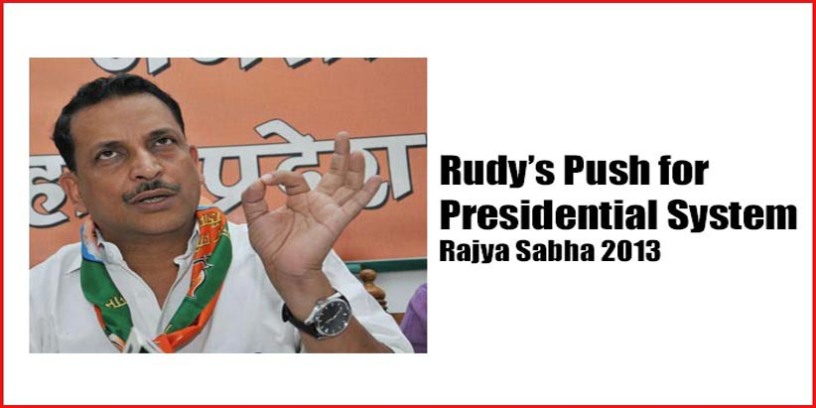In 2013, Rajiv Pratap Rudy, a BJP General Secretary and Member of Parliament, submitted a Resolution in the Rajya Sabha pushing for India to adopt the presidential system. He noted that “there is an urgent need to look into the existing Parliamentary form of Government vis-à-vis its achievements in the last 63 years.” As a member of the opposition, Rudy had submitted a Private Member Resolution. The media however erroneously reported that he had submitted a Bill. People started taking great interest. But before the Resolution could be moved the Rajya Sabha was adjourned due to the constant disruptions in the House.
Here’s Rudy’s Resolution asking for “direct elections for chief executive at the Centre and States,” and the “separation of Executive from Legislature.”…
RAJYA SABHA
——
LIST OF BUSINESS
Friday, May 10, 2013
11 A.M.
———
QUESTIONS
QUESTIONS entered in separate lists to be asked and answers given.
————
(FROM 2.30 P.M. TO 5.00 P.M.)
PRIVATE MEMBERS’ BUSINESS (RESOLUTIONS)
3. SHRI RAJIV PRATAP RUDY to move the following Resolution:-
“Having regard to the facts that:
(i) the Indian Constitution draws its framework from the Government of India Act, 1935 as passed by the British Parliament;
(ii) the Constitution of India was adopted on 26th January, 1950;
(iii) the Constitution of India adopted the Westminster Parliamentary form of Democracy;
(iv) the present democratic system has adopted the majoritarian Parliamentary form of Government;
(v) various Governments at the Centre have moved to amend the Constitution 118 times and have amended the Constitution 98 times;
(vi) the Constitution of India believes in the federal polity where it has envisaged the separation of powers between the legislature, judiciary and the executive;
(vii) India is the largest democracy in the world but it has failed to achieve the basic objectives enshrined in the Constitution;
(viii) there is a growing mistrust in the functioning of the Indian democracy thus giving rise to social movements;
(ix) several movements in rural and urban areas are in the form of civil society movements involving the middle class and growing violent forms of naxalism in several rural areas due to dysfunctional governments, lack of delivery and accountability;
(x) there is growing distrust among the citizens of the country giving rise to several debates on honesty and integrity of polity and need to have strict anti-graft laws;
(xi) the falling standards of Indian polity are matter of concern;
(xii) the participation of unsocial elements in the democratic process has raised several eye-brows and has led to witness several cases of corruption in the States and at the Centre;
(xiii) provision of whips on legislators, filing affidavits of having no criminal record and regarding assets and liabilities to contest elections, imposition of anti-defection laws, curbs on election expenditure have all been legislated to establish the credibility of elected representative or to restrain selection of people indulging in such activities, making the very basics of electability a suspect;
(xiv) there is an urgent need to look into the existing Parliamentary form of Government vis-à-vis its achievements in the last 63 years;
(xv) there is a need to relook the democratic process and consider delinking the executive from elected political representatives, both in the States and at the Centre;
(xvi) there is a need to devise a system where lawmakers are themselves not the implementers of the law;
(xvii) there is a need to look for a system where the elected representatives confine themselves to framing of laws and hold others accountable for implementation of law, rather than be implementers of law themselves; and
(xviii) there is a need to look into the pattern of the democratic process overall and for looking into the process of direct elections for chief executive at the Centre and States opting for Constitutional change ushering a regime of direct accountability to the person elected for the administration of the country,
therefore, this House urges upon the Government to make provisions in the Constitution of India for ensuring separation of Executive from Legislature and that the elected representatives of a majority party do not hold executive or ministerial positions.”
SHUMSHER K. SHERIFF,
Secretary-General.
NEWDELHI;
May 7, 2013.
